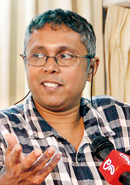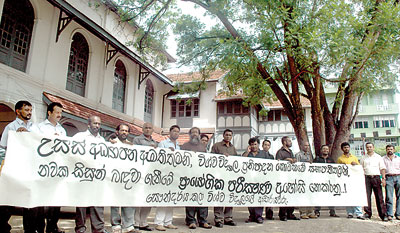Editorial
RTI: A people’s govt. must enact it
View(s):It took an Indian Minister to come to Colombo and extol the virtues of a Right to Information (RTI) Law and explain how it has empowered the ordinary citizens of his country.
Ironic as it is, this piece of progressive legislation was first introduced in Sri Lanka even before India did, but it was stillborn. A Freedom of Information Bill was drafted by a committee headed by the then Attorney General with stakeholders involved in the process. The Bill was approved by the Ranil Wickremesinghe cabinet in 2004 but the premature dissolution of Parliament by then President Chandrika Kumaratunga put paid to the efforts. India passed the law a year later, enhancing the spirit of the law by making it a citizen’s ‘Right’, even more than a ‘Freedom’ and called it a Right to Information Law. And we now must countenance an Indian Minister telling us what a good law they have.
Jairam Ramesh, the Indian Minister of Rural Development and Drinking Water and Sanitation, which are major issues in India, told a seminar on poverty alleviation in Colombo on Thursday:
“One of the good things which have happened in India during the last decade is the idea about rights-based approach. I have spoken about the Social Security Guarantee Act but that was not the first right to be introduced, in fact there was even more revolutionary legislation introduced which is the Right to Information; it is the right to information that has transformed the administration in our country. It is the right to information that is beginning to be opening of books in Panchayats, in local bodies, in muster-rooms. Today you can go to my ministry’s website and you will find in the muster-rooms all the people who have sought employment in all the villages of India. It is available on the website, along with the photographs, so this is what transparency can do in the implementation of rural development programmes”.
In India, the campaign for an RTI began from the grassroots in the state of Rajasthan and worked its way up to the national level and Parliament. In Sri Lanka, this campaign was initiated by the media organisations. Civil society was slow to pick it up and unlike in India, organised civil society and non-government agents are few and far between. Either way, the end result is to empower the citizen with information.
The simple example given is – ‘if you entrust your money to someone to do your marketing, you would check the bills and ask the person how the money was spent. Similarly, why can’t this principle be extended to a government that has been entrusted with the people’s purse?’
The culture of accountability, especially in public finance, is woefully absent in Sri Lanka. That is why more and more instances of wastage, corruption and mismanagement get exposed and reported. Often, billions of rupees are lost to the country, yet no one is accountable, no one is punished. And, the people, are none the wiser as to where the money has gone, and why so.
More than one hundred countries around the world have a Right to Information Law. Some call it a Freedom to Information Law while others refer to it as an Access to Information Law, but they are all the same thing. All major countries in our region have this law. Sri Lanka stands out like a sore thumb. Time will surely run out for the Government that will be found severely wanting and accused of deliberate dilly-dallying in failing to bring in such a progressive law. It is only a government that wishes to manipulate public funds by keeping its people in the dark, in blissful ignorance, that will refrain from bringing in such a law.
Unfortunately, the Government is more focused on restricting the flow of information than giving access to it. This law is not about the breaking news of the day, but about how public funds are spent by those who have control over its expenditure.
A government that claims it is a ‘people’s government’ can no longer ignore modern legislation that empowers citizens. Very soon this will be a fundamental human right. The sooner the Government comes to realise this, the better.
The Dons speak up
The demand by the country’s academics for a salary increase has been continuing since 2008. Their main demand is that their basic salaries be increased. More than 10 rounds of discussions have been held, but no solution reached.
Earlier, it was the Higher Education Ministry that was handling the negotiations. The academics have lost faith in dealing with it. Now, the President’s Secretary has stepped in as a mediator to resolve matters. He met the members of FUTA (Federation of University Teachers Associations) on July 3 and said he wanted a week’s time to study the latest proposals on resolving the issue. A second meeting was held on Thursday (July 12), but no headway has been made, with still more time asked for.
A suggestion has been made by the President’s Secretary for a Presidential Commission on Higher Education, but given the obvious credibility, or rather the lack of it, of commission reports, FUTA is not interested. The academics agree there is a need to go into the wider issues of higher education, but their salary issue must be given priority.
FUTA claims it has a membership of 4,500 academics or 80 per cent of the country’s academics in the state universities. Its members have been on strike since July 4. With the exception of a few faculties, including the Colombo Medical Faculty, most other campuses are affected by the strike.
The intimidation of its president by having unidentified persons hovering around his house, has further angered FUTA members. The academics say they have no intention of ending the strike until they get some concrete proposals from the Government. The President’s Secretary told them on Thursday the academics were not being treated as just any other trade union by the Government. Their role in society is a special one. So be it, and so should the Government treat this continuing problem that has been allowed to drag on partly due to stubbornness on the part of the
University Grants Commission, but largely due to the inefficiency and arrogance of the Ministry of Higher Education.
The issue is, however, not one exclusively restricted to the salaries of these academics. It may be outside the mandate of FUTA to insist that the Government stick to 6 per cent of the budget being allocated to education, but it is justified in asking that ad hoc decisions by the ministry be done away with and collective decision-making be undertaken in terms of the University Act. Furthermore they have asked that the autonomy of the universities be respected. Political meddling has been the bane of independent institutions across the board in this country and the universities are no exception.
No wonder then, that the seats of higher learning in Sri Lanka are going the same downward way as most other institutions that were once upon a time, respected and revered.
comments powered by Disqus














